|
|
|
Sort Order |
|
|
|
Items / Page
|
|
|
|
|
|
|
| Srl | Item |
| 1 |
ID:
095964
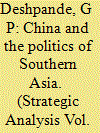

|
|
|
|
|
| Publication |
2010.
|
| Summary/Abstract |
China has throughout its history played a significant role in Southern Asia. China is a large and very populous country. However, China's role throughout its history has been more related to its civilisation and ideas than to its size. There have been wars and invasions, peace and tributes, but the overriding impression that one has of China's role in Southern Asia is that of ideas institutions. When China's century-old revolution culminated in the establishment of a Communist government in China, its role acquired a very crucial dimension. It is in intended to look into more general aspects of what the successful Communist revolution in China has meant and means to Southern Asia.
|
|
|
|
|
|
|
|
|
|
|
|
|
|
|
|
| 2 |
ID:
095955
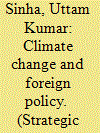

|
|
|
|
|
| Publication |
2010.
|
| Summary/Abstract |
Climate change has acquired high priority in the United Kingdom's foreign policy. It has in recent years raised the issue of climate change at various international forums, such as G-8, the European Union and the UN Security Council. This article examines how and why climate change has become one of the core components of UK foreign policy, and in so doing analyses the interconnections between foreign policy and climate change, and interactions between domestic and international politics.
|
|
|
|
|
|
|
|
|
|
|
|
|
|
|
|
| 3 |
ID:
095946
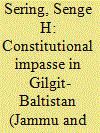

|
|
|
|
|
| Publication |
2010.
|
| Summary/Abstract |
The legal status of Gilgit-Baltistan, which is part of Jammu and Kashmir that is under Pakistani occupation, has remained undefined in successive Pakistani constitutions. Pakistan governs the region with ad hoc presidential ordinances, resulting in transitory political arrangements. It was Prime Minister Benazir Bhutto who first introduced the so-called Northern Areas Governance Order of 1994, after shelving the draconian and inhumane Frontier Crimes Regulation, with which Pakistan ruled the region like a colony. With some amendments, the same ordinance was later renamed the Legal Framework Order by President Musharraf in 2007 and more recently as the Gilgit-Baltistan Empowerment and Self-Governance Order by the Zardari regime. The term 'self-governance' in the current ordinance is coined as a strategic move to defuse pressure of rights organisations. The order establishes the Gilgit-Baltistan Legislative Assembly and the Gilgit-Baltistan Council. It also creates the post of chief minister; and a governor, who will represent the president of Pakistan and function as the de facto rulers of Gilgit-Baltistan.
|
|
|
|
|
|
|
|
|
|
|
|
|
|
|
|
| 4 |
ID:
095942
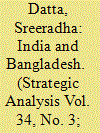

|
|
|
|
|
| Publication |
2010.
|
| Summary/Abstract |
After a hiatus, relations between India and Bangladesh are back on track again. This period was ushered in with the Awami League government assuming power in Dhaka after the culmination of the much delayed ninth Jatiya Sangsad elections. The bilateral relations received a further boost with Bangladeshi Prime Minister Sheikh Hasina's four-day visit to India on January 10, 2010. It was breakthrough visit for a number of reasons. Not only was it Sheikh Hasina's first visit to India after taking over as prime minister on January 2009, but it has once one again lent the Indo-Bangladesh relations with a growing sense of optimism. The meetings between the leaders of India and Bangladesh radiated a spirit of goodwill that was singularly lacking in the bilateral context until recently. Apart from the positive atmospherics that this landmark visit has generated, the two sides have set forth a bilateral agenda that, if well implemented, will ensure the process of being development partners is ongoing and is not subject to regime compatibility.
|
|
|
|
|
|
|
|
|
|
|
|
|
|
|
|
| 5 |
ID:
095957
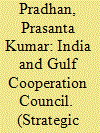

|
|
|
|
|
| Publication |
2010.
|
| Summary/Abstract |
India's relationship with the Gulf Cooperation Council (GCC) has been primarily based on mutual trade and business. GCC countries are the main source of energy for India and a market for Indian commodities. India's five-million-strong workforce forms a natural linkage between India and the GCC. But despite such strong trade linkages, which are still growing, political and strategic relations between India and the GCC have been found lacking. Recent years have witnessed signing of defence and security agreements between India and some of the GCC countries. But there still remain some irritants in the relationship, which need to be addressed by both sides. The emerging security and regional and international order in the region demands increased interaction between India and the GCC. As the GCC is also opening up, this paper argues that it is time for India to look beyond trade and business, and engage the GCC in political, security and strategic fields.
|
|
|
|
|
|
|
|
|
|
|
|
|
|
|
|
| 6 |
ID:
095944


|
|
|
|
|
| Publication |
2010.
|
| Summary/Abstract |
The India-Bhutan relationship is perhaps the only bilateral engagement in South Asia, yielding high dividends to both parties. While Bhutan all through the years has appreciated India for its economic assistance, India, for its part, has been sensitive to Bhutan's developmental needs. The relationship has helped Bhutan shape a unique developmental trajectory based on gross national happiness. Bhutan's economy has grown substantially in recent years. However, the development cooperation between the two countries can be effectively divided into three significant waves. The first wave (1960s-1970s) focused on building the social and physical infrastructure. The second wave (1980s-1990s) saw substantive efforts towards democratisation and decentralisation. The third wave of the relationship focused on developing hydel projects, which has now expanded into other areas such as information technology, disaster risk management, education and research cooperation.
|
|
|
|
|
|
|
|
|
|
|
|
|
|
|
|
| 7 |
ID:
095952


|
|
|
|
|
| Publication |
2010.
|
| Summary/Abstract |
AFRICOM is a new institution representing the new manner of US engagement. This is different from the EU model of engagement and comes at a time when India and China are seen as important partners of Africa. This paper is written to provide an insight into AFRICOM from an Indian perspective of Africa. This differs from the EU view and also from Africa's own response. US policy towards Africa consists of African Growth and Opportunity Act (AGOA) + AFRICOM; whereas AGOA is better understood, AFRICOM is not. This paper proposes to fill some of the gaps in its understanding. It points to the perception that the US manner of engagement is more political than economic, and it differs from the functional engagements that India, China or even the EU have with Africa.
|
|
|
|
|
|
|
|
|
|
|
|
|
|
|
|
| 8 |
ID:
095950


|
|
|
|
|
| Publication |
2010.
|
| Summary/Abstract |
India's economic reforms of 1991 changed India's development paradigm, and raised the country to a new growth path. The country weathered the 2008 global recession with remarkable resilience and is now in the process of a return to an annual growth rate in excess of eight per cent. In parallel with this economic renaissance, India's external policy has also witnessed rejuvenation, described so well in C. Raja Mohan's Crossing the Rubicon1 and in other recent works.
|
|
|
|
|
|
|
|
|
|
|
|
|
|
|
|
| 9 |
ID:
095953


|
|
|
|
|
| Publication |
2010.
|
| Summary/Abstract |
Command and control of nuclear weapons was the edifice upon which great power nuclear strategy was based. Empirical Cold War research later proved that this edifice was, in fact, only a power keg. Therefore, US non-proliferation-minded analysts propounded logical reasons for their claim that new nuclear nations will be unable to demonstrate prudence in nuclear weapons management. The unique Indian case, pronounced from the organisation theory perspective, proves to the contrary. India's nuclear organisation is not a static entity; its unique strategic culture together with a political standard operating procedure for nuclear weapons management reduces the exaggerated possibility of any catastrophe.
|
|
|
|
|
|
|
|
|
|
|
|
|
|
|
|
| 10 |
ID:
095961


|
|
|
|
|
| Publication |
2010.
|
| Summary/Abstract |
The emerging changes in the security calculus within the Korean Peninsula are forcing Japan to revisit its existing position on the nuclear issue. The changing security environment has triggered several debates within Japan on the nuclearisation of the island nation. Although, at present, domestic opinion within Japan is opposed to exercising the nuclear option, there has been a break in the hitherto established taboo to have an open debate on the country's nuclear policy. These debates have triggered thinking on the circumstances in which Japan might choose to cross the nuclear rubicon.
|
|
|
|
|
|
|
|
|
|
|
|
|
|
|
|
| 11 |
ID:
095948


|
|
|
|
|
| Publication |
2010.
|
| Summary/Abstract |
President Barack Obama's foreign policy orientation towards East Asia seems to be characterised by continuity rather than change, and is not so very different from that of his predecessors. With Japan and South Korea, Obama is trying to revitalise bilateral alliances. With China, he continues on his predecessor's policy of greater engagement, though he has offered some concessions during his visit to Beijing in November 2009. However, North Korea remains a real and huge challenge for Obama to test his engagement in East Asia.
|
|
|
|
|
|
|
|
|
|
|
|
|
|
|
|
| 12 |
ID:
095963


|
|
|
|
|
| Publication |
2010.
|
| Summary/Abstract |
What is the common strand that runs through an academic, scientific, or policy-oriented project? What makes an institute or a think-tank competitive in present times? The answer to these questions is the need for a good research methodology, adapted to a contemporary situation.
|
|
|
|
|
|
|
|
|
|
|
|
|
|
|
|
| 13 |
ID:
095959
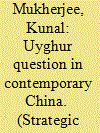

|
|
|
|
|
| Publication |
2010.
|
| Summary/Abstract |
This article examines the policies the Chinese state has taken towards the Uyghur Muslim community in Xinjiang since the Cultural Revolution and tries to analyse to what extent have these changed with time. The article argues that the Uyghur community has been seen as a threat to the stability of the state, which is why harsh measures have been directed towards this ethnic group. The party has tried to maintain control over these groups by force by attempting to confine all forms of religious activity and by suppressing any independent body. This is because religion generally and Islam in particular (which is practised by most Uyghurs) are not viewed favourably by Chinese officials, since religious ideology did not sit comfortably with what the state considered to be nationalist patriotic values. However, recent democratising tendencies, which have implications for all religious groups, also need to be taken into consideration before making an assessment of the situation. Recent events have shown us that Chinese state policies do not necessarily move in a straight line.
|
|
|
|
|
|
|
|
|
|
|
|
|
|
|
|
|
|
|
|
|